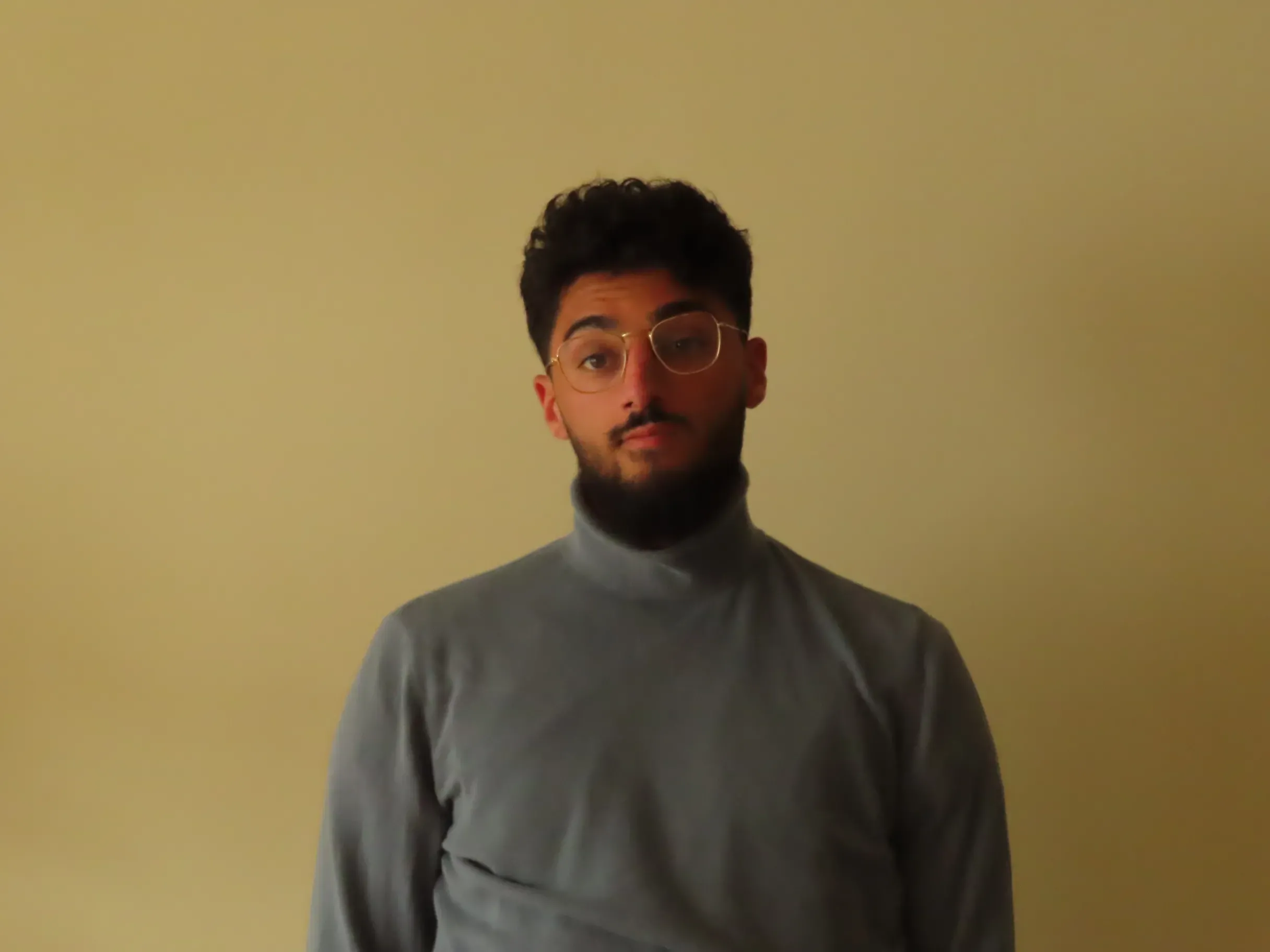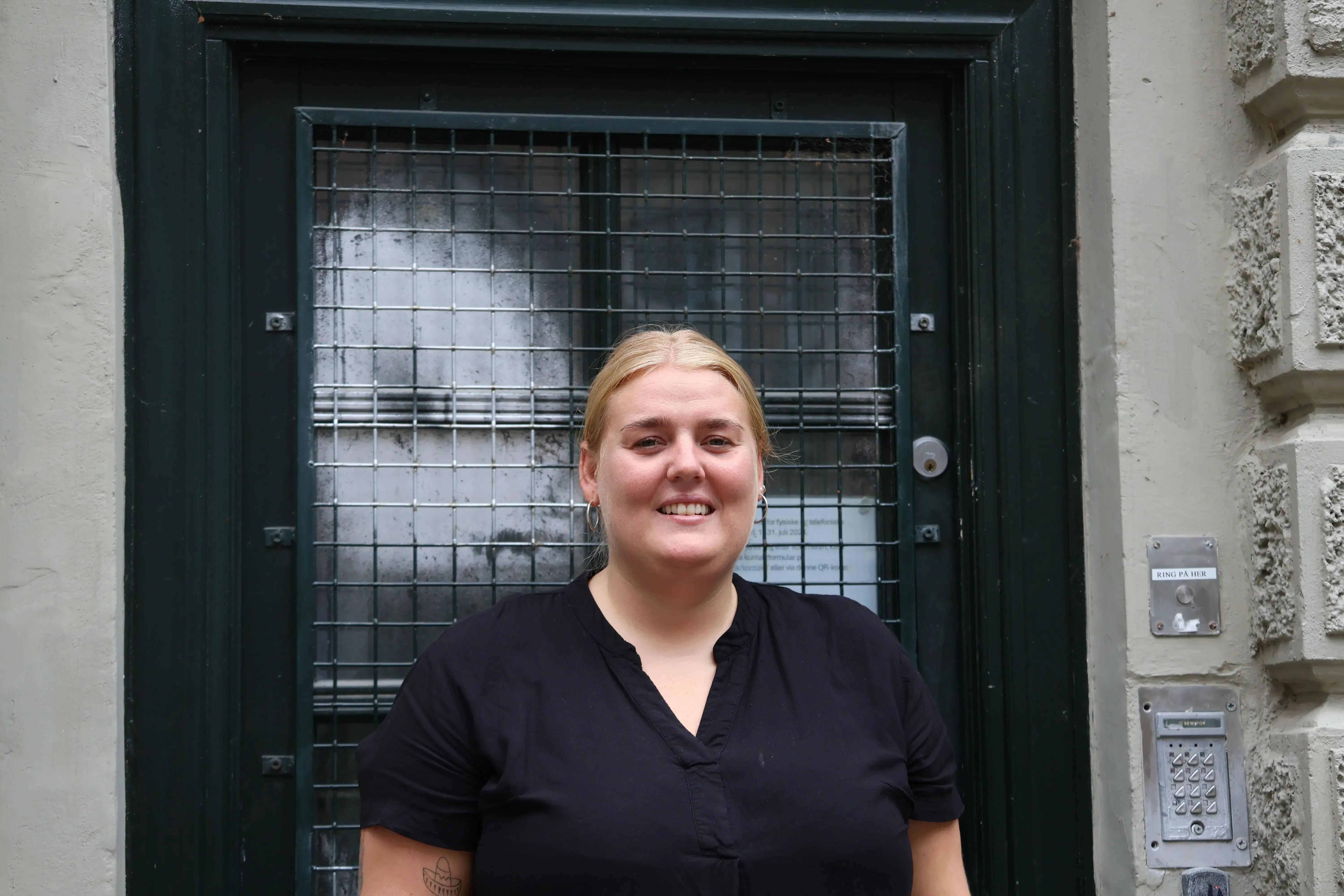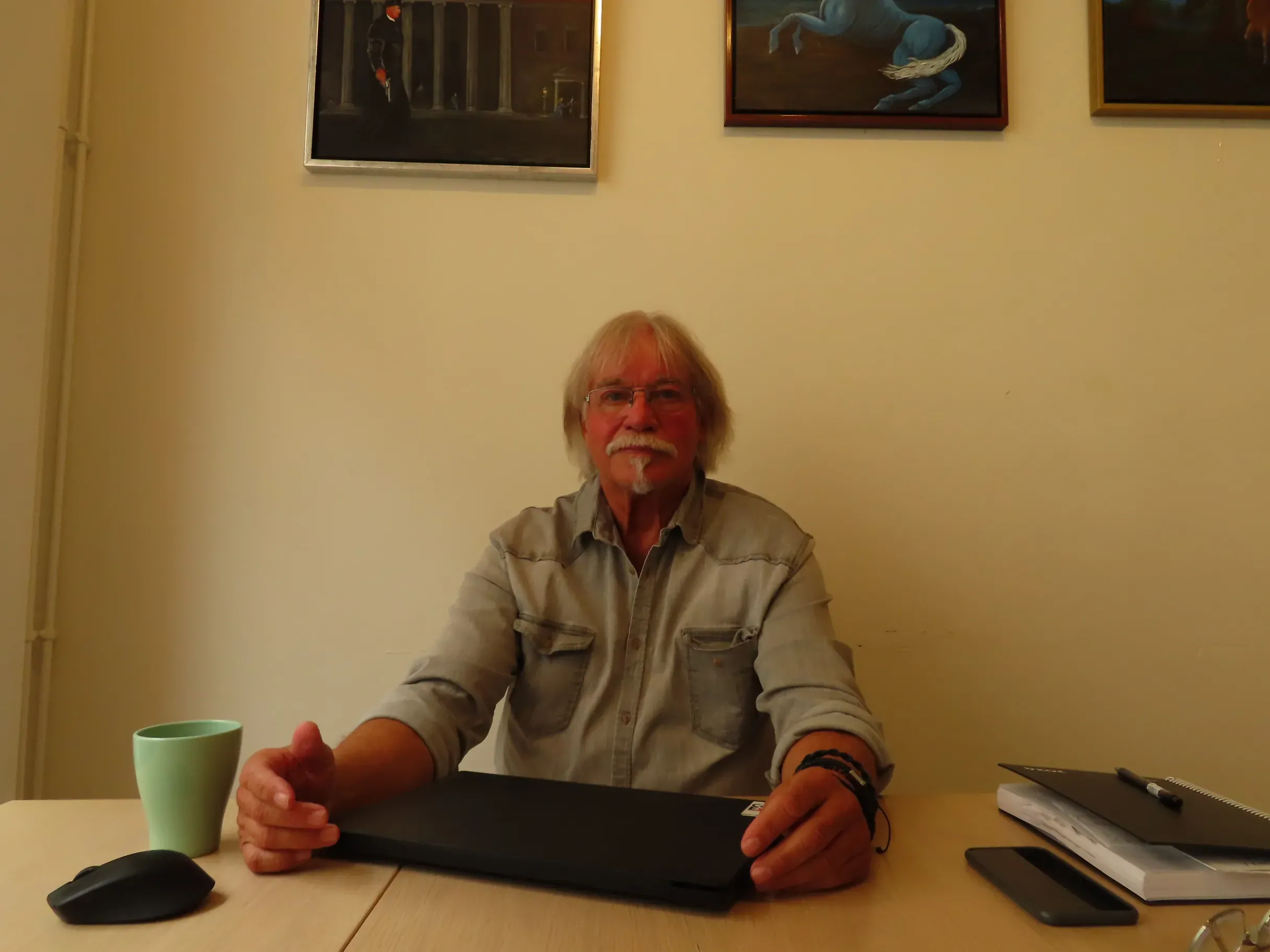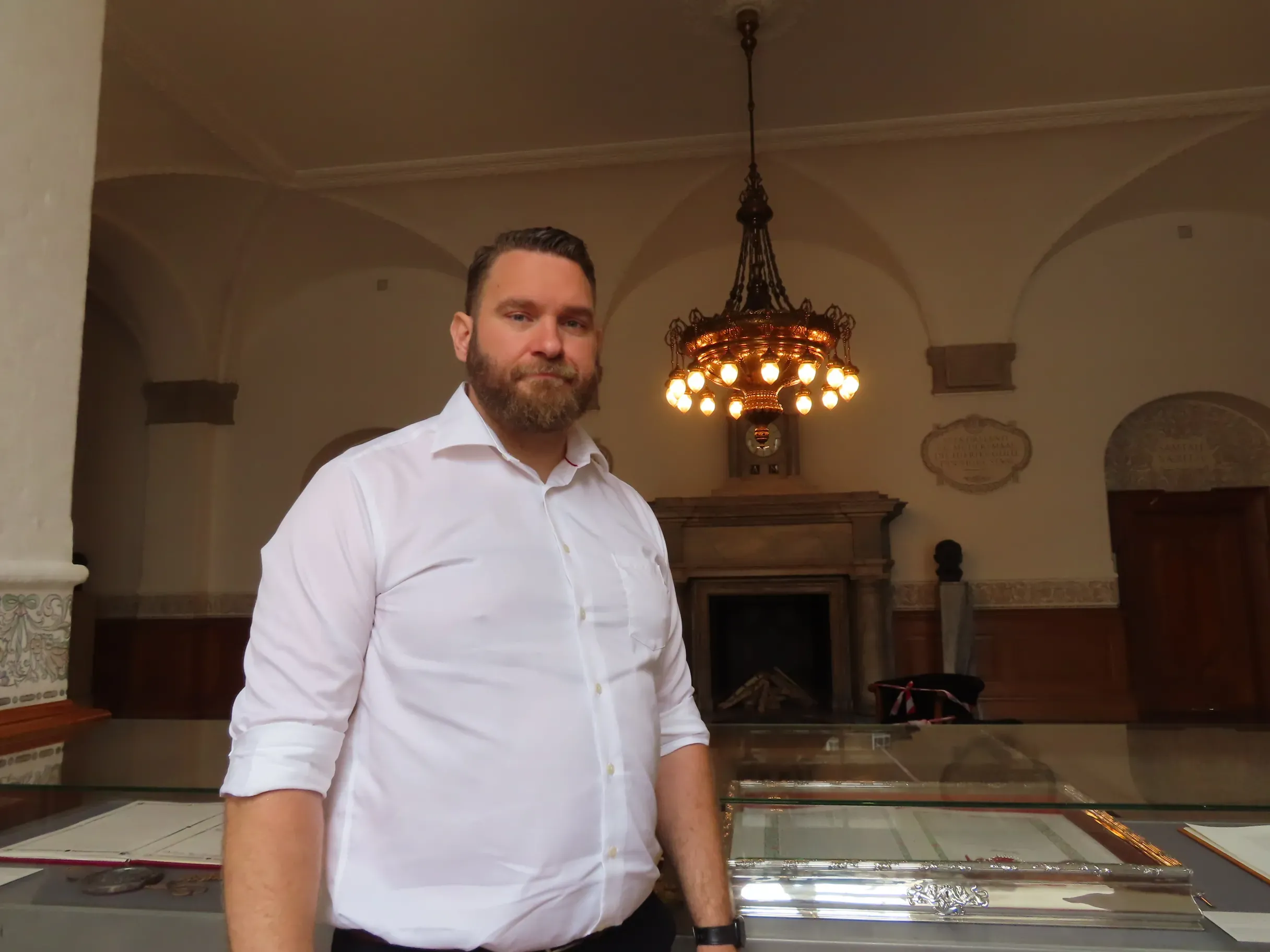
The first time Haidar Ansari was in front of a judge, he was 15 years old. Instead of fearing his sentence and dreading his next five birthdays in prison, he felt accomplished.
“It's a feeling of achieving what you always wanted to be like, those guys (who are) in front of the judge. If I remember correctly, I laughed when he imprisoned me,” Ansari said.
Ansari’s family moved to Denmark from Iraq. His mother did not speak Danish and was left to raise four children alone while his father served five years in prison.
Ansari—now a 22-year-old poet who has written a book, titled Institutionaliseret (Institutionalized)—is in debt from the prison sentences he served as a teenager.

As a nonprofit journalism organization, we depend on your support to fund more than 170 reporting projects every year on critical global and local issues. Donate any amount today to become a Pulitzer Center Champion and receive exclusive benefits!
His book focuses on his experiences growing up in prison. He advocates for change in Denmark's criminal justice system, specifically high court costs owed by formerly incarcerated people upon release, made higher by interest. It's an issue Ansari has personally experienced.
Ansari said the first time he saw someone get stabbed, he was 11 years old; three years later he would stab someone himself. For Ansari, who grew up in the high-crime neighborhood of Urbanplanen in Copenhagen, Denmark, this was normal, he said.
Over the course of his teenage and young adult years, he served multiple sentences—his longest was for five years after stabbing someone while defending his friend in a fight.
Ansari said he did not grow up with role models, and he felt that the system was not set up for him to succeed. “We got lost in every aspect,” he said.
Ansari said he got kicked out of school in the fifth grade because of his behavior, and was sent to another campus, which was in a wealthier area. He said this was the first time he truly understood his identity and where he came from, but he was ashamed.
He stopped going to school, and looked at going to prison as a better option. There, he said, he had access to therapy, empathetic adults, and additional services, as is the case for Danish prisons. It wasn’t until his release, he said, when he began feeling the effects of his crimes.
In Denmark, all cases are tried by public attorneys paid for by the state at a set salary. However, when someone is convicted of a crime, they have to repay their court and legal fees. As of 2023, the amount of debt in legal fees in Denmark is 6.6 billion Danish krone (DKK) or $913 million USD, and is owed by 88,000 people.
In a 2023 study, the Danish Institute for Human Rights acknowledged that the vast majority of people have no way of paying back their debt. The interest rate, which begins building before one is released from prison, is over 7%—close to double any rate that a bank in Denmark would give, according to Anne Okkels Birk, a Danish professor of criminology.
In Denmark, only those convicted have to pay legal fees. When the law was first introduced, legal fees were low, Okkels Birk said. Now, fees have increased. Starting in 2006, the Danish Tax Agency determined the amount someone must pay, considering their job or wealth. Before then, the police made that decision.
“They saw it and set up just to get as much money as possible, which makes sense, but something that did not make sense so much was that they did not look into what is the purpose here,” Okkels Birk said. “They have shot themselves in the foot, they have shot ourselves, us as a country, in the foot by putting focus on short-term payment rather than the long-term benefit.”
Ansari owed 1.1 million DKK, or $150,000 USD. With the current interest rate of over 7%, and the average Danish yearly income estimated at $20,000 before taxes, Ansari said it would take about 59 years to repay his debt.
“If I just live a normal life, I'll never come out of that,” Ansari said.
When he was younger and imprisoned, debt was not something he considered, he said. He looked at his attorney as a friend.
“I didn't think that my best friend cost 2,000 an hour, but he did,” Ansari said.

Misunderstanding criminal debt is not uncommon, said Julie Jørgensen, project manager of the Social Legal Aid Foundation in Copenhagen, and her organization oftentimes is the one that informs people that they will leave prison indebted to the state.
“That's our biggest job to ... prepare them that when you come out and you get that job that you worked very hard to get your first income, you will be shocked,” Jørgensen said. “We would rather tell them that while they are in hands of some professionals in the prison, than when they come out and are alone, because the consequences of that will be bigger.”
The Social Legal Aid Foundation aims to explain bills to incarcerated people, answer questions, and help with the next steps after prison.
“That's where people, these kinds of people, will talk to themselves and say why the f--- do I get up every morning and fight for this, if it pays off that little economically?” Jørgensen said.
Defense attorney Mette Maria Lorentzen said other attorneys have the opportunity to ask the court to lower a client's legal fees; however, this practice is uncommon because clients are often unaware of this before serving their sentence.
“This is a problem for later on,” Maria Lorentzen said.
Maria Lorentzen said the debt in Denmark should be talked about more.
“I can see that there is a great value in showing to people that they have to pay for their criminal actions by themselves,” Maria Lorentzen said. “But on the other hand, it's really a problem that if they want to change, it's difficult for them to change because of that.”
After serving his 14-year-sentence, Hans Andersen sought an unregulated job to avoid paying his debts. He found work in demolition for a few years, where former gang members comprised much of the workforce, he said. Many formerly incarcerated people seek similar employment to avoid repaying debt at the cost of possible safety and environmental risks, and potentially re-entering illicit activity, Okkels Birk said.
“It could be that the activity is, for instance, the demolition work, but that the specific employer is somebody who does not report their case to the [Danish Tax Agency] [and] does not follow workers employment risk,” Okkels Birk said.
Jørgensen said part of her role is working to tell formerly incarcerated people that there is another option—and that living with debt is not impossible.
“It's not a criminal thing to have debt—you did something criminal, and you went to prison, and now that's over,” Jørgensen said. “You also still have debt, that's not a criminal part.”
Andersen has tried to make the best of his situation. He works at Cafe Exit, an organization committed to helping people re-enter society and understand their debt, while simultaneously providing a social outlet.
Thinking about his crime, his life before prison, and his growing guilt was almost too much for him to bear, he said. While in prison, he seriously considered suicide, and at one point, he even considered asking his ex-wife to tell his young children he had passed away. However, in many ways, the lack of freedom in prison was easier than what was to follow, he said.
“It was easier to be in prison than being released,” Andersen said. “Because you are facing so many challenges and problems that you are not able to solve.”
After paying his debt for 10 years with 8% interest, his debt is now higher than when he was first released.
Working for Cafe Exit is what gave Andersen a chance to start over. He was initially reluctant to join, however, and mainly took the job because of the difficulty finding employment with a criminal record, he said.

“I thought I had seen enough of prisons and inmates for the rest of my life,” Andersen said.
Now, Andersen works directly with former inmates and also talks to members of the Danish government to persuade them to change the laws surrounding prison debt. Cafe Exit leadership is comprised of many formerly incarcerated people, giving the organization a different perspective through its ability to speak with current inmates and Danish officials.
“We are in a better position to tell the inmates their side of the story because we have been there ourselves,” Andersen said.
Years after his release, he said, he still feels the negative effects of the prison system.
“The real punishment starts when you are being released,” Andersen said. “Because you have to face that you have to live the rest of your life as a poor citizen and you will never be able to get a decent job. You will not be able to have a salary that way you can provide a family with a decent life. So that's a big punishment.”
The Danish government has created a team of researchers, politicians, and lawyers to find a solution to the prison debt problem. Karina Lorentzen Dehnhardt, a member of Folketing, or the Danish Parliament, said she hopes a solution will be found soon.
Lorentzen Dehnhardt said there is not enough funding to create a solution that all parties can agree upon.
However, she said the team’s new proposal focuses on discouraging youth from engaging in long-term criminal activity. The proposal also suggests debt forgiveness for youth who remain crime free for five years.
Other politicians have different perspectives.

Steffen Larsen, a member of Parliament and the conservative Liberal Alliance Party, agrees that interest rates are too high. Though he supports formerly incarcerated people not having to pay off debts immediately, he believes they should still be responsible for the tax dollars they have cost Danish citizens.
“You committed the crime,” Larsen said. “Why should I, the taxpayer, pay for your crimes? We've already paid enough to have the police capture you, we’ve also paid for the courts, and now we are paying for the district attorney to drag you in as well. We’re paying for these things, and then we also have to pay for your defense after you lost the case.”
While Larsen said left-leaning politicians believe criminal activity is a product of a person’s upbringing, he believes anyone who served a prison sentence should take responsibility, regardless.
“You have agency,” Larsen said. “In general, if you commit the crime, you do the time and you also pay the levies that were put upon the people, so you have to pay and that's that.”
Ansari said the combination of his prison sentences and debt feels like “kicking somebody at the bottom.” He said the people affected by the prison system and the associated debt are those who already struggle financially, and typically have worse home lives.
“This is a lifetime sentence,” Ansari said. “I can never come out of this and the thing that really upsets me is that, who are the children will come in and get in prison and get the debt? It's not the wealthy white kids, it’s like the bottom of the society.”
Ansari’s life has changed for the better in many ways, he said. He is able to support and encourage his younger brother to have a better life. Yet, he still struggles in ways he did not expect, he said.
“I can still, when I think about it, get really depressed,” Ansari said. “I have a feeling that no matter what I do I just can't have a normal life. I can't get married because no woman would share the debt.”









